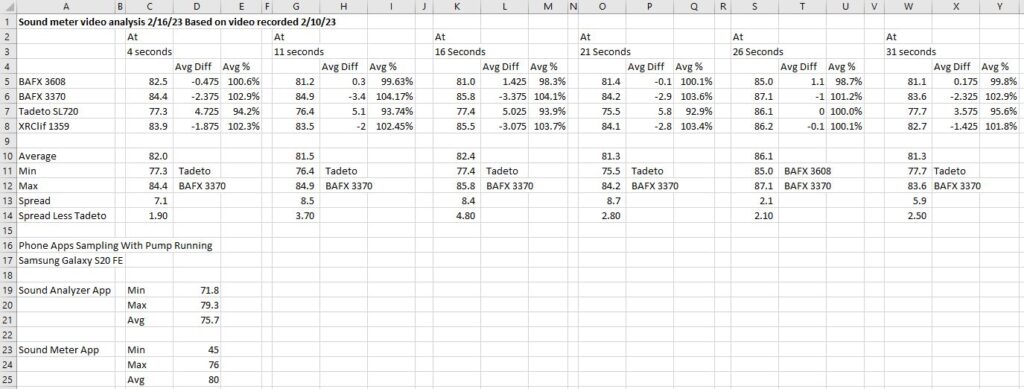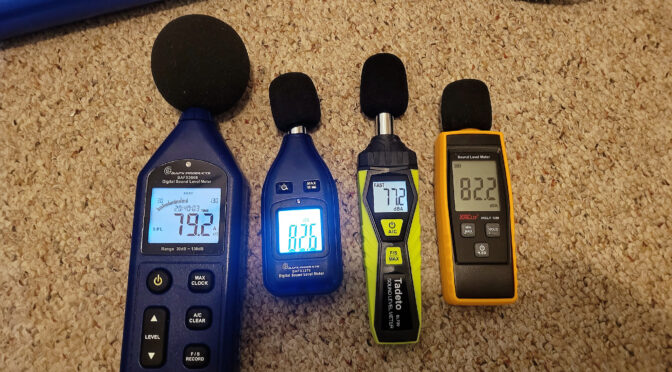There’s an old saying that nobody is sure of where it came from that says if you have one clock you know the time. If you have more than one, you are never quite sure. The reason for this is that if the clocks have different times then which is wrong or right? Well, I guess now we have time servers, atomic clocks and what not to help answer “what time is it?”.
Now why did I open with that? Well, the only sound level meter I had to measure the decibels of anything was my phone and two different apps that kind of agreed. When reading reviews, folks would say that phone sound level apps were not accurate. Well, I decided to buy a sound level meter to be more accurate … that was in 2017 and I thought I knew how many decibels things were using my cool BAFX3608 meter.
Fast forward to February 2023
I decided to test my GX CS4 and I also wanted to test some airgun moderators so I thought I would order in a few more inexpensive sound level meters to get readings in different spots – a BAFX3370, a Tadeto SL720 and a XRCLIF-1359.
I was using my GX CS4 compressor to top off my 6.8 liter carbon fiber bottle and thought it would be a great time to get sound readings from relatively the same location. I lined them up and took a video to capture sound readings on each meter at a certain time by freezing the video.
Here’s the video so you can hear the compressor and see the meters:
Well, I recorded the readings at 4,11, 16, 21, 26 and 31 seconds. I then calculated the average of the four and compared the meters to the average. The BAFX 3608, BAFX 3370 and XRCLIF were closest. The Tadeo was introducing quite a bit of variation into the samples. With one exception at 26 seconds, it always registered the lowest decibels. Excluding the Tadeto, the average spread was 2.97db across the three meters. With the Tadeto, the average spread increased to 6.8db.
By the way, the manufactures claim +/-1.5db of accuracy for the two BAFX meters, +/-2.0db for the Tadeto and +/-1.5 for the XRCLIF. That means the ranges should have been at most 3.5db apart. The recorded data showed spreads far wider than that.
What this spread tells me is that the two BAFX units and the XRCLIF are in relative agreement given their stated accuracy. My tendency is to think they are closer to whatever the real measurement actually is and discard the Tadeto data. It also tells me that when you buy cheap uncalibrated sound meters you get cheap uncalibrated sound meters.
What about the apps?
I tried the both the “Sound Analyzer” and “Sound Meter” apps for my Samsung Galaxy S20FE. The Sound Analyzer reported an average of 79.3 and the Sound Meter app averaged 80. The sampling was done by holding my phone about the same distance from the CS4 and letting each app collect data for about 30 seconds. Given how fast the CS4 pumps, the apps had quite a few cycles to record.

Conclusion
I have a vague idea that the average sound level was somewhere between 81.5 to 86.1db as the machine operates if I exclude the Tadeto’s recordings. The samples were drawn at different times and the pump had a repetitive rhythm to it so I am sure the volume did differ but looking at the spread across the meters and the deviation from the average tells me that three meters are closer to one another (the two BAFX models and the XRCLIF) and the Tadeto is an outlier. The apps don’t really agree with anything either.
To wrap it up, thanks to my PC periodically synching its clock to a time server, I know it is about 9:20pm right now. What were the actual sound levels during each of those samples … now that I don’t really know with any precision – I have a ballpark range. I guess some day I will need to buy a quality calibrated sound level meter – what I probably should have done from the start. If you need to buy a meter and can’t afford a higher end unit – buy either the BAFX 3370 or the XRCLIF-1359. The BAFX 3608 is no longer made (as mentioned – I bought it back in 2017).
Here are the GX compressors from the CS4 down to the CS1
- GX CS4 – 6.8L tanks, fluid cooled, longer run time, 5800 PSI/40Mpa – External 12 volt power supply [My current compressor]
- GX CS3 – 1 liter tanks, air cooled, 4500 PSI/30Mpa – External 12 volt power supply [I used this and now my friend has it]
- GX CS3-I – 1 liter tanks, air cooled, 4500 PSI/30Mpa – Internal power supply [I used the regular CS3 but they are the same other than the power supply]
- GX CS2 – .5 liter tanks, air cooled, 4500PSI/30Mpa – 12 volt or 110 AC [I have not used this one]
- GX CS1-I – .5 liter tank, air cooled, , 4500PSI/30Mpa, 12 volt or 110AC internal power supply [I have not used this one]
- FastToBuy 30Mpa Oil Water Filter – Not a GX product but I recommend this filter and you need one between the compressor and your tank or PCP airgun. You will need an extra hose from it to your tank or airgun plus the proper fittings.
Note, I have to buy all of my parts – nothing here was paid for by sponsors, etc. I do make a small amount if you click on an ad and buy something but that is it. You’re getting my real opinion on stuff.
If you find this post useful, please share the link on Facebook, with your friends, etc. Your support is much appreciated and if you have any feedback, please email me at in**@*********ps.com. Please note that for links to other websites, we are only paid if there is an affiliate program such as Avantlink, Impact, Amazon and eBay and only if you purchase something. If you’d like to directly contribute towards our continued reporting, please visit our funding page.
